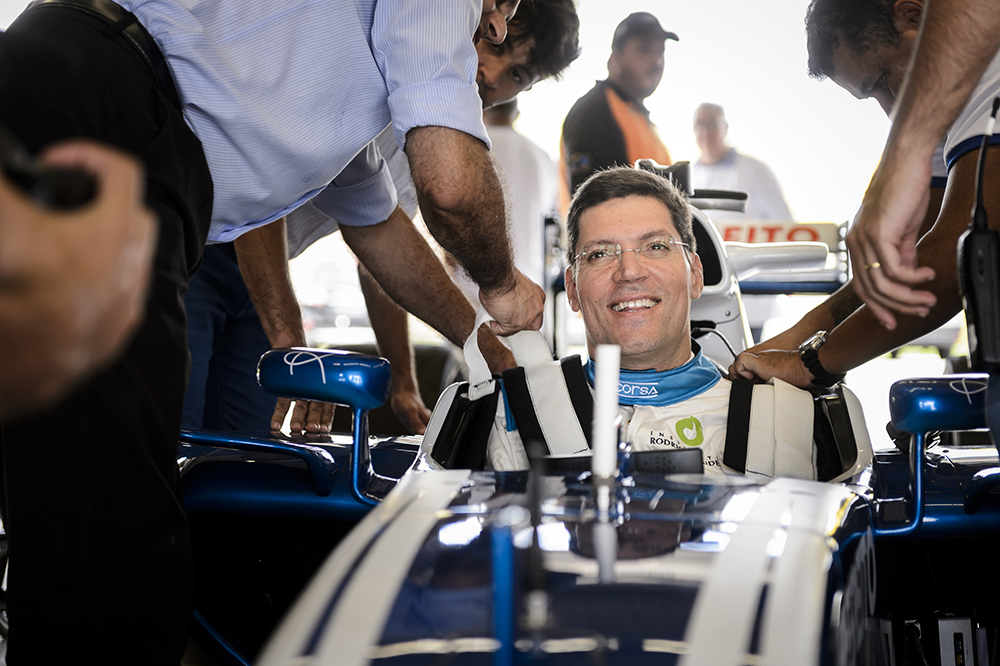Good stories make us to think about changes and inspire people and society’s transformation. Think about the power narratives can gain when they are shared with 100 million people simultaneously. That is TV Globo’s audience (the world’s second largest television station) in Brazil. By means of this audience, Rede Globo embraces causes such as Human Rights, Environment, Health and Education.
There was a discussion generated recently in our country due to the transgender character named Ivana, played by actress Carol Duarte, in the soup opera named A Força do Querer. It is a very nice example of what can be triggered when an important issue is aired in a society. Based on the soap opera, the right to assume a gender identity gained the media and began to be discussed on public transportation, street markets, supermarkets and within Brazilian families.
Rede Globo has started an internal process to engage people named GoodMob in 2014. The initiative involves the creation of specific content developed by the journalism and design teams together to include these subjects in open, cable and web TV programs.
“We follow the society’s evolution. We bring relevant subjects to Rede Globo,” says Beatriz Azeredo, Rede Globo Social Responsibility’s director. “We go deep inside these subjects and bring them back as contents that inspire reflection and behavior change.”

Rodrigo Mendes, who has paralysis, is equipped by a team to drive a Formula 1 car in the movie named Movido a Respeito (Ramon Vasconcelos/Rede Globo)
MOTIVATED BY RESPECT
Rodrigo Mendes, who has paralysis, is equipped by a team to drive a Formula 1 car in the movie named Movido a Respeito (Ramon Vasconcelos/Rede Globo) Rodrigo Mendes, who has paralysis, is equipped by a team to drive a Formula 1 car in the movie named Movido a Respeito (Ramon Vasconcelos/Rede Globo) GoodMod has existed for more than two years, but it only began to gain positive impact in 2017, when Rede Globo was awarded a Silver Lion at Cannes Festival of Creativity with Movido a Respeito campaign. In the film, Rodrigo Mendes, a tetraplegic man since he was 18 after being shot in a robbery, drives a Formula 1 car controlled by brain sensors.
More than 100 professionals from Rede Globo were involved to make things happen. The technology team was in charge of creating a helmet with sensors that allowed to map the electrical impulses generated by the pilot’s brainwaves. The data was sent to an on-board computer connected to the steering system: Rodrigo finally could drive. The message behind the 1,5-minute video was: When people with disabilities have access, they can do everything.
GodMod has existed for more than two years, but it only began to gain positive impact in 2017, when Rede Globo was awarded a Silver Lion at Cannes Festival of Creativity with Movido a Respeito campaign. In the film, Rodrigo Mendes, a tetraplegic man since he was 18 after being shot in a robbery, drives a Formula 1 car controlled by brain sensors.
More than 100 professionals from Rede Globo were involved to make things happen. The technology team was in charge of creating a helmet with sensors that allowed to map the electrical impulses generated by the pilot’s brainwaves. The data was sent to an on-board computer connected to the steering system: Rodrigo finally could drive. The message behind the 1,5-minute video was: When people with disabilities have access, they can do everything.
RIGHTS AS THE ORDER OF THE DAY
GoodMod is structured in five principles: Education, Human Rights, Youth, Sustainability and Health and Quality of Life. Each one of them spreads up in actions encouraged by the social responsibility team or inspired by subjects that are already part of the program, increasing their presence in journalism and entertainment scripts. “It’s more than a campaign,” explains the director. “It’s a-360-degree action anchored on a number of other mobilization fronts.”
In the human rights principle, which the initiative comes with Rodrigo Mendes and Ivana, the soap opera character, a platform named Tudo começa pelo respeito (Everything begins with respect) was created in partnership with UNESCO, UNICEF, UNAIDS and UN Women. More than 30 short films have been produced and distributed in the intervals of the programs. They talk about women rights, elderly, LGBT, black, religious, seropositive people and other groups vulnerable to discrimination.
Two years ago, the Joint United Nations Program on HIV/AIDS (UNAIDS) asked Rede Globo to air the risks of HIV increase among young people, as 40% of them reported in a survey that they do not wear condoms.
“We made a film demystifying the HIV test and asked UNAIDS’ guys to talk to Emanuel Jacobina, who is the writer of the new season of Malhação [a famous teenager soap opera from Rede Globo],” says Beatriz. Once sensitized by the subject, Emanuel included in his plot a young couple of seropositive and seronegative (one has HIV and the other does not) and their conflicts at school and within the family. The initiative was so successful that it generated a web series starring by the couple.
TO MAKE KNOWN THE STORIES
Another platform created by Rede Global to work on principles of GoodMob is REP – Repercutindo histórias (Making Known Stories), which has a TED-inspired format in which people tell their experiences and trajectories. Each REP deals with a subject. The series Viva a diferença shows the stories of people whose lives were marked by diversity.
Stories like the young, black and blind woman Nathalia Santos, who was a victim of prejudice and now studies journalism. There is also Bráulio Bessa, a poet, photographer and Northeastern Brazilian singer that improvises strictly metered verses, who created the fan page Nação Nordestina and counts with more than 1 million followers in order to break the prejudice against the Northeastern through the diffusion of culture of the region.
LEARNINGS AND PROVOCATIONS

The actress Carol Duarte (lying on another actress’ lap) performing the transgender Ivana in “A Força do Querer” (Raquel Cunha/Rede Globo)
In the case of the transgender in the soap opera, Gloria Perez, the writer, added the character in the plot. The social responsibility team saw it as an opportunity to create and promote other actions. One of them was in the newspaper section named Corpo (Body): A non-specific article published on Cadernos Globo application, which brings interesting and important reports.
There are already 12 newspaper sections that go deep in the subjects such as urban mobility, conscious consumption and education and all data based on conversations among journalism and entertainment teams, specialists, activists, NGOs and other organizations. Since 2014, 16 meetings have been held to bring these groups together.
The production of Velho Chico (another famous soap opera from Rede Globo referring to the São Francisco river, best known as old Chico) also offered opportunity to work on environmental issues last year. From a conversation with the producer, a technical partnership with Conservação Internacional-CI created content that contributed to a more in-depth approach to the subject. For nine months, the writer met with CI technicians to talk about social and environmental aspects of São Francisco river, scenes of the production.
The appearance of GoodMob according to Beatriz Azeredo, focused on organizing the mobilization that has been made by the TV network throughout its history. Like Criança Esperança campaign, launched in 1986, and O Espigão soap opera, which, in 1974, helped adding the word ecology into the Brazilians’ vocabulary. Another milestone is the Malu Mulher series, which, in the late 70s discussed female empowerment.
We built the bridge among those who make Globo’s program, people and organizations with legitimacy to talk about relevant issues to the society,” says Beatriz.
Published on 09/15/2017